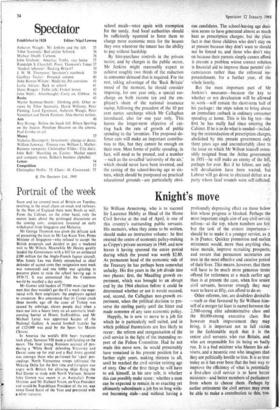Knight's move
Sir William Armstrong, who is to succeed Sir Laurence Helsby as Head of the Home Civil Service at the end of April, is one of this country's outstanding public servants. His memoirs, when they Come to be written, should make an instructive volume: he first entered the centre of economic policy-making as Cripps's private secretary in 1949, and now leaves it having spanned the entire period during which the pound was worth $2.80. As permanent head of the economic side of the Treasury he has perhaps been somewhat unlucky. His five years in the job divide into two phases; first, the Maudling growth ex- periment, which was brought to an abrupt end by the 1964 election before it could be determined whether or not it would succeed, and, second, the Callaghan non-growth ex- periment, when the political decision to pre- serve the sterling parity until the bitter end made nonsense of any sane economic policy.
Happily, he is now to move to a job for which he is particularly well suited, and in which political frustrations are less likely to occur: the reform and reorganisation of the civil service in the light of the impending re- port of the Fulton Committee. Had he not made this move now, he would presumably have remained in his present position for a further eight years, making thirteen in all, until he reached the civil service retiring age of sixty. One of the first things he will have to ask himself, in his new role, is whether this can possibly make sense: whether a man can be expected to remain in so exacting yet ultimately subordinate a job for so long with- out becoming stale—and without having a profoundly depressing effect on those below him whose progress is blocked. Perhaps the most important single aim of any civil servide reform—at the top, where numbers are fai, but the task of the utmost importance= should be to make it a younger service, as it is in France. Quicker promotion and earlier retirement would, more than anything elsew raise morale, improve recruiting prospects; and ensure that permanent secretaries are men in the most effective and creative period of their lives. This means, however, that there will have to be much more generous terms offered for retirement at a much earlier age than is at present the case, when few senior civil servants, however strongly they may want to leave at fifty, can afford to do so.
• Other reforms, too, are doubtless desirable —such as that favoured by Sir William him- self of a merger (at least in name) between the 2,500-strong elite administrative class and the 80,000-strong executive class. But however much improvement they may bring, it is important not to fall victim to the fashionable myth that it is the senior civil servants who run Britain, and who are responsible for its being so badly run. It is a bad minister who blames his ad- visers, and a neurotic one who imagines that they are politically hostile to him. It is as true today as it has ever been that the best way to improve the efficiency of what is potentially a first-class civil service is to have better ministers—and better members of parliament from whom to choose them. Perhaps by earlier retirement the civil service may even be able to make a contribution to this, too.






























 Previous page
Previous page